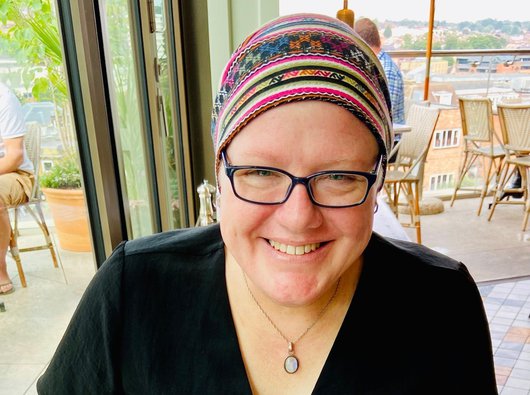Managing the effects of myeloma
Myeloma is a blood cancer that also affects other parts of the body such as the bones and kidneys.
What is supportive care?
As well as treatment for the myeloma itself, you may need other medication to manage these ongoing effects.
This is sometimes called supportive care because it’s not treating the disease directly but helping to manage the symptoms, or prevent complications.
Support against infection
Myeloma affects how the immune system works and this makes people with myeloma more likely to get infections that are more dangerous and last longer. Your level of risk will be different at different times, but treatment for myeloma generally increases your risk of infection.
Your hospital team or GP will advise you about the symptoms of infection, how to protect yourself and what to do if you think you have an infection. You can also read our information about understanding infection and managing your risk.
An infection can become very serious very quickly when you have myeloma and could develop into a life-threatening conditions called sepsis. So if you think you have an infection, tell your hospital team or GP immediately. Infections can be treated effectively with medicines like antibiotics, but it’s best to get help straight away. Your hospital team will tell you how to get urgent help if you feel unwell.
Watch our short video about infection symptoms and what to do:
Managing infection
Here are some ways to prevent or treat infection that your hospital team may recommend:
You may be given antibiotics to take regularly when you are on treatment or after a transplant, to try to prevent infections.
You should have a range of vaccinations to protect you against certain illnesses. These may not be as effective as they would be for someone who has a normally functioning immune system, but they will still offer you an extra level of protection. Your doctor will decide when it’s best to have these vaccinations.
Vaccinations you should have include:
- Flu vaccination – it’s a good idea for close contacts to have this too.
- Covid vaccinations – you should have all the primary doses and boosters recommended for people with immunosuppression (weak immune systems).
- pneumococcal and HiB vaccinations – these protect you against several infections including certain types of pneumonia, sepsis and meningitis.
If you have a stem cell transplant as part of your treatment, you will need to have your childhood vaccinations done again. Your doctor will tell you about this.
You should not have any “live” vaccines like the MMR (measles, mumps and rubella) or the most widely used shingles vaccine Zostavax. These are not safe for people with myeloma.
Shingles is an infection of a nerve and the skin around it. It can affect you if you’ve had chickenpox in the past, even if you had it a long time ago. It tends to affect people with weak immune systems.
Doctors may prescribe an antiviral medicine such as aciclovir to stop you getting shingles. Or you may be offered a vaccine for shingles called Shingrix. Shingrix is not live, and therefore safe for you to have.
You may be given intravenous immunoglobulins - a transfusion of blood plasma (the liquid part of the blood) from a donor. The plasma contains antibodies which will help you fight off infections while your own level of antibodies is low.
As well as being on the priority list for covid vaccinations, you may also be eligible for antiviral or antibody treatments to stop you becoming seriously ill if you catch covid. Read our information about how to get free covid tests and get assessed for covid treatments if you test positive.
"If you can keep a calm level head, you can get through. But you have got to look after yourself, for immunity reasons, like coughs, colds, making sure people stay away from you."
Scott, living with myeloma since 2019.
Find out more about protecting yourself against infection.

Support for bone damage
Bone problems are a common complication of myeloma. The bones in our body are constantly renewing themselves – doctors call this remodelling. When you have myeloma, the myeloma cells interrupt bone remodelling. This creates holes called bone lesions or lytic lesions which make the bones weak and easy to fracture. It also causes bone pain.
Most people with myeloma will take bone strengthening medicines called bisphosphonates. You will also be given dietary advice and advised to take calcium and vitamin D supplements. Weight-bearing exercise is also known to help – ask your hospital team or GP to recommend suitable exercises.
You may be referred to an orthopaedic surgeon if you have significant problems with your spine or other bones. There may be an operation you can have to repair or strengthen weak or fractured bones.
You may also be referred to a clinical oncologist for radiotherapy to treat a specific area of bone. This aims to slow down the damage and reduce pain.
Support for your kidneys
About one in every two people with myeloma (50%) will have kidney damage at some point after a diagnosis, and some have signs of it when they are diagnosed. Some myeloma drugs can affect your kidneys too.
Doctors will carefully monitor your kidney function and will adjust the doses of your myeloma drugs as needed. You may be referred to a nephrologist (a kidney specialist) if you need specific treatment.
Your doctor or nurse will give you general advice about looking after your kidneys such as drinking a lot of water, as this can help keep your kidneys healthy.
Support for nerve damage
Our bodies have a network of nerves that carry chemical messages from the brain to other parts of the body. Myeloma can cause damage to nerves, and some myeloma drugs can cause this too.
In myeloma, the nerves most often affected are the peripheral nerves – the nerves in our legs, feet, arms and hands. Damage to these nerves is called peripheral neuropathy.
Your doctor will want to know if you have any symptoms of tingling, loss of feeling or pain in your legs, feet, arms or hands. If you are having treatment, they may adjust or change your drugs. They may also prescribe medicines that treat nerve pain.
You may be referred to a neurologist (a nerve specialist) if you need specific treatment.
Support for anaemia
Anaemia is the medical term for a low level of red blood cells and is an effect of myeloma. It can make you feel tired and breathless.
If you have symptoms of anaemia, your doctor may suggest injections of a hormone called erythropoietin (EPO) which stimulates your bone marrow to make more red blood cells. In some cases, you may be offered a blood transfusion.
Managing fatigue
Fatigue is a common symptom of myeloma as well as a side effect of treatment. It’s a feeling of extreme tiredness that can come on suddenly and leave you feeling completely drained.
You may experience fatigue even in a remission period. There are lots of things that can help, including light exercise and finding the right balance between activity and rest.
"I think my wife and I have lost a bit of spontaneity because we know that I have limitations in terms of my energy levels, and that I'm going to get tired. So these days we need to have a plan."
Cecelia, living with myeloma since 2020
Read more about how to manage fatigue.

Pain management
Most people with myeloma experience some sort of pain before or after diagnosis.
Pain is debilitating – it can affect your mental health as well as your physical health and restrict what you are able to do. But you can get help to manage it.
If you are experiencing pain anywhere in your body, tell your doctor. There is no need to wait until the pain is significant, and it may be easier for your doctor to help you if you report it straight away.
You should also talk to your doctor before you take over-the-counter painkillers. That’s because you need to know what’s safe for you, with the treatment you’re having or had in the past.
Treatment for the myeloma will help with the pain caused by myeloma in the longer term. But there are other ways to manage pain in the shorter term, depending on what’s causing it:
- Painkillers – There’s a range of painkillers doctors can prescribe, depending on your perception of whether the pain is mild, moderate or severe.
- Nerve pain blockers – These can treat pain caused by peripheral neuropathy.
- Bone strengthening medicines – These will help with bone pain.
- Radiotherapy – This targets pain in a specific area of bone.
- Surgery – This can help if the pain is caused by problems with your spine or bone fractures.
Your hospital team may also suggest physiotherapy or self-help techniques. Other people with blood cancer may have advice too but check with your hospital team before trying anything that’s new for you.
Myeloma UK has more information about pain and myeloma.

Need help to talk to your medical team?
Our Support Service is here to talk things through.
